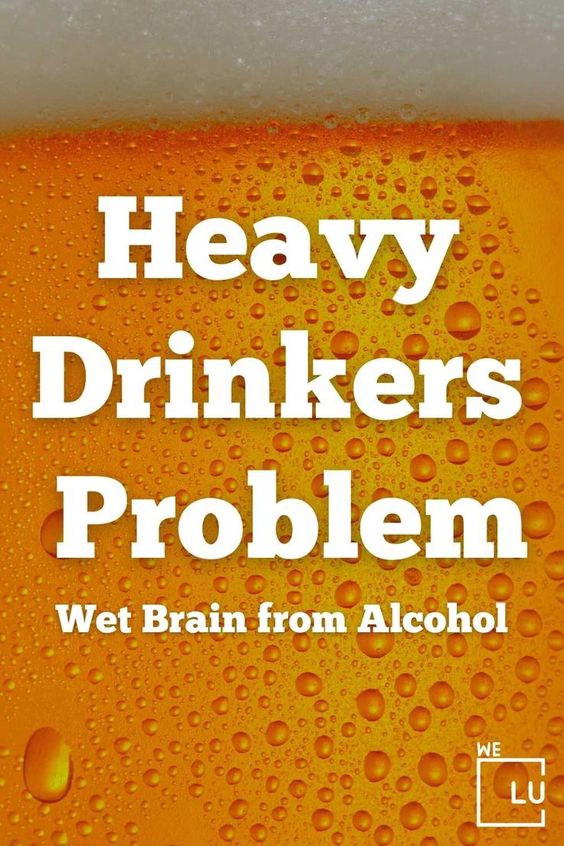Last Updated: January 23, 2022
What is Wet Brain in Alcoholics?
Wet brain, also known as Wernicke-Korsakoff syndrome, is a brain disorder due to vitamin B1 deficiency. Wernicke’s encephalopathy is a degenerative brain disorder caused by the lack of thiamine. It may result from alcohol abuse, dietary deficiencies, prolonged vomiting, eating disorders, or the effects of chemotherapy. B1 deficiency causes damage to the brain’s thalamus and hypothalamus.
Korsakoff syndrome (also called Korsakoff’s amnesic syndrome) is a memory disorder that results from vitamin B1 deficiency and is associated with alcoholism. Korsakoff’s syndrome damages nerve cells and supporting cells in the brain and spinal cord, as well as the part of the brain involved with memory.
Wet Brain Syndrome from Alcohol
What is a wet brain in alcoholics? Although Wernicke’s and Korsakoff’s are related disorders, some scientists believe they are different stages of the same alcohol-related disorder, called Wernicke-Korsakoff syndrome. Wernicke’s encephalopathy represents the “acute” phase of the disorder, and Korsakoff’s amnesic syndrome represents the disorder progressing to a “chronic” or long-lasting stage. [1]

Skip To:
Learn More:
End the Emotional Pain. Get Your Life Back.
Feeling Depressed, Anxious or Struggling with Mental Health Illness? Get Safe Comfortable Mental Health Dual Diagnosis High-Quality Therapy From Counselors That Care. Begin Your Recovery Now.
Hotline: (509) 348-4077

Wet Brain Symptoms From Alcoholism
Symptoms of Wernicke encephalopathy include:
- Confusion and loss of mental activity can progress to coma and death
- Loss of muscle coordination (ataxia) that can cause leg tremors
- Vision changes such as abnormal eye movements (back and forth movements called nystagmus), double vision, eyelid drooping
- Alcohol withdrawal
Symptoms of Korsakoff syndrome include:
- Inability to form new memories
- Loss of memory can be severe
- Making up stories (confabulation)
- Seeing or hearing things that are not there (hallucinations)
Can You Reverse Wet Brain?
What is a wet brain in alcoholics, and is it reversible? Korsakoff syndrome is most commonly seen in chronic alcohol abuse and is thought to be on the spectrum with Wernicke encephalopathy. However, Wernicke encephalopathy is acute and often reversible, while Korsakoff syndrome is chronic and may be irreversible. [2]
Most of Wernicke’s encephalopathy symptoms can be reversed if detected and treated promptly and completely. Stopping alcohol use may prevent further nerve and brain damage. However, improvement in memory function is slow and usually incomplete. Without treatment, these disorders can be disabling and life-threatening.
Get Help. Get Better. Get Your Life Back.
Searching for Accredited Dual Diagnosis Mental Health Centers Near You?
Even if therapy failed previously, or are in the middle of a difficult crisis, we stand ready to support you. Our trusted behavioral health specialists will not give up on you. When you feel ready or just want someone to speak to about counseling alternatives to change your life call us. Even if we cannot assist you, we will lead you to wherever you can get support. There is no obligation. Call our hotline today.
FREE 24/7 Dual Diagnosis Mental Health Services HotlineWho is Most at Risk of Developing a Wet Brain?
Wernicke encephalopathy and Korsakoff syndrome are not different conditions. They are different stages of the same disease process. Both are due to brain damage caused by a lack of vitamin B1. Lack of vitamin B1 is common in people who have alcohol use disorder. It is also common in people whose bodies do not absorb food properly (malabsorption). This can sometimes occur with a chronic illness or after weight-loss (bariatric) surgery.
Korsakoff syndrome tends to develop after symptoms of Wernicke encephalopathy go away. Wernicke encephalopathy causes brain damage in the lower parts of the brain, called the thalamus and hypothalamus. Korsakoff syndrome results from permanent damage to areas of the brain involved with memory.
What is Wet Brain from Alcohol & Its Complications?
What is a wet brain in alcoholics, and how dangerous is it for them? Without treatment, Wernicke-Korsakoff syndrome gets steadily worse and can be life-threatening. It is possible to control symptoms (such as uncoordinated movement and vision difficulties) with treatment. This disorder can also be slowed or stopped.
Possible Complications
Complications that may result include:
- Alcohol withdrawal
- Difficulty with personal or social interaction
- Injury caused by falls
- Permanent alcoholic neuropathy
- Permanent loss of thinking skills
- Permanent loss of memory
- Shortened life span
Comfortable Facilities & Amenities
High-Quality Mental Health Services & Behaviroal Health Substance Abuse Treatment
Rehab Centers TourRenowned Mental Health Centers. Serene Private Facilities. Inpatient Rehab Programs Vary.
Mental Health Helpline: (509) 348-4077Proven recovery success experience, backed by a Team w/ History of:
15+
Years of Unified Experience
100s
5-Star Reviews Across Our Centers
10K
Recovery Success Stories Across Our Network
- Low Patient to Therapist Ratio
- Comprehensive Dual-Diagnosis Treatment
- Complimentary Family & Alumni Programs
- Coaching, Recovery & Development Events
- Comfortable Onsite Medical Detox Center
Late Stage Alcoholism
This final phase of alcoholism leads to a complete loss of control over alcohol consumption—where the person feels they must drink. [3] At this point, the alcoholic’s body begins to require the presence of alcohol to feel normal, known as an alcohol dependency. When individual does not drink alcohol regularly, they may experience alcohol withdrawal symptoms and intense cravings.

Treating Alcohol Wet Brain
Treatment depends on the underlying condition. Many conditions are treated mainly with rehabilitation and supportive care to help the person with activities lost due to areas where brain function is affected. Medicines may be needed to reduce aggressive behaviors that can occur with some of the conditions.
Abstaining from alcohol and maintaining a healthy diet is a cornerstone of effective long-term treatment. For those suffering from addiction or alcoholism, the We Level Up treatment center is here. As a licensed and accredited rehabilitation center, we are dedicated to helping you meet your goals, one day at a time.
The goals of Wernicke-Korsakoff syndrome treatment are to control symptoms and to prevent the disorder from getting worse. Some people may need to stay in the hospital early in the condition to help control symptoms.
Monitoring and special care [4] may be needed if the person is:
- In a coma
- Lethargic
- Unconscious
Vitamin B1 is usually given by injection into a vein or a muscle as soon as possible. This may improve symptoms of:
- Confusion or delirium
- Difficulties with vision and eye movement
- Lack of muscle coordination
Vitamin B1 often does not improve the loss of memory and intellect that occur with Korsakoff syndrome. Stopping alcohol use can prevent more loss of brain function and damage to nerves. A well-balanced, nourishing diet can help, but it is not a substitute for stopping alcohol use.
World-class, Accredited, 5-Star Reviewed, Effective Mental Health Dual Diagnosis Programs. Complete Integrated Inpatient Rehab with Free Post Discharge Therapy Planning.
Hotline: (509) 348-4077End the Emotional Pain Rollercoaster. Gain Stability & Happiness Through Recovery Treatment. Start Mental Health Counseling Today. Get Free No-obligation Guidance by Behaviroal Health Specialists Who Understand Mental Health Recovery.
Alcohol Use Disorder Treatment
We Level Up treatment center can help with inpatient therapy programs exclusively. Because each client is different and requires unique, comprehensive care according to their situation, our staff of well-trained physicians and nurses first begin the client relationship with a detailed one-on-one assessment.
Detox
Withdrawal from alcohol is an important first step to overcoming your alcohol-related problems. However, withdrawal isn’t an effective treatment by itself. You’ll need further treatment and support to help you in the long term. [5]
There are two significant signs of alcohol addiction: tolerance and withdrawal. Alcohol addiction is a dangerous condition because it can ultimately become life-threatening. So, alcohol detox allows the body to eliminate all alcohol in the body and return to its usual functioning. An individual who has been struggling with a moderate to severe alcohol use disorder (alcohol addiction) has a significant likelihood of developing withdrawal symptoms and could benefit from the help of a detox program.
The longer and heavier the drinking, the more prolonged and more severe detox will be. For this reason, going through the process sooner than later, and getting help, is critical to recovery.
Once fully admitted and evaluated, the 2nd stage of detox gets underway: stabilization. Based on the data provided during the admissions process, patient feedback, and the symptoms observed, our experienced team of medical addiction professionals will provide care to keep the patient stable and as comfortable as possible.
Alcohol detox can be dangerous, mainly if you do it without the help of a professional because delirium tremens and other withdrawal symptoms that may afflict the detoxing patient are hazardous and fatal. Therefore, detoxing in a rehab center is advisable to access qualified professionals who can manage comfortably alcohol detox and withdrawal complexities.
Cognitive Behavioral Therapy
Cognitive-behavioral therapy (CBT) is a widely used treatment for alcohol abuse and addiction to help individuals identify negative thought patterns, emotions, and problematic behaviors and learn how to make healthy lifestyle changes that decrease the urges to drink alcohol and use other substances; paying particular attention to symptoms of psychosis, depression, and other co-existing mental health-related problems or dual diagnosis that are exacerbated by stress.
Counseling Services
Individual, group and family counseling services are offered in the majority of mental health and substance abuse treatment programs to “get to the root of the problems”, improve communications and relationships, and motivate the abuser toward positive changes. . The structured guidance of a counselor helps the patient stay on track and in the right perspectives as they strive to achieve their potentials and goals of recovery.

Increasing awareness of high-risk situations and warning signs and developing avoidance strategies and coping skills for handling those situations is an important part of treatment known as relapse prevention. Knowing what to do should relapse occur is equally important to ensure any long-term recovery success.
Our FREE 24-hour Hotline can help you with the resources for alcoholic organic brain syndrome and alcoholism. We can help you answer addiction-related questions such as “What is wet brain in alcoholics?” Get a free consultation for your best-fitting treatment programs and free rehab insurance verification. Call We Level Up today and speak with one of our addiction specialists to check your rehab insurance coverage and benefits.
We Level Up addiction counselors will discuss the average cost of the program based on the personalized treatment that works best for you.
We Level Up Washington Mental Health Center: Primary Mental Health Treatment with Secondary Co-Occurring Treatments
The We Level Up Washington primary mental health center stands ready to help. Offering secondary treatment programs for underlying conditions like alcohol addiction that frequently fuels harmful behaviors. Taking that first step to get the professional support you need can be life-transforming.
We know how mental health disorders and secondary co-occurring substance abuse diagnoses directly affect one another. The We Level Up Washington treatment center provides recovery programs through science-based mental health treatments that can help you feel better. Call us now for a free mental health evaluation!
Inpatient medical detox and residential primary addiction treatment may be available at affiliated facilities at other We Level Up Treatment Centers locations beyond the Washington treatment facility.
Experience Transformative Recovery at the We Level Up Treatment Center.
See our authentic success stories. Get inspired.
Get the help you deserve.



Start a New Life
Begin with a free call to a behavioral health treatment advisor. Learn more about our dual-diagnosis programs. The We Level Up treatment center network delivers recovery programs that vary by each treatment facility. Call to learn more.
- Personalized Care
- Caring Accountable Staff
- World-class Amenities
- Licensed & Accredited
- Renowned w/ 5-Star Reviews
We’ll Call You
Sources
[1] Wernicke-Korsakoff Syndrome – National Institute of Neurological Disorders and Stroke (NINDS)
[2] Korsakoff Syndrome – National Center for Biotechnology Information
[3] World Health Organization. (1951). Expert committee on mental health: Report on the first session of the alcoholism subcommittee. World Health Organization Technical Report Series, 42. 1-24.
[4] Wernicke-Korsakoff syndrome – U.S. Department of Health and Human Services National Institutes of Health
[5] Alcohol Misuse – https://www.nhs.uk/conditions/alcohol-misuse/treatment/